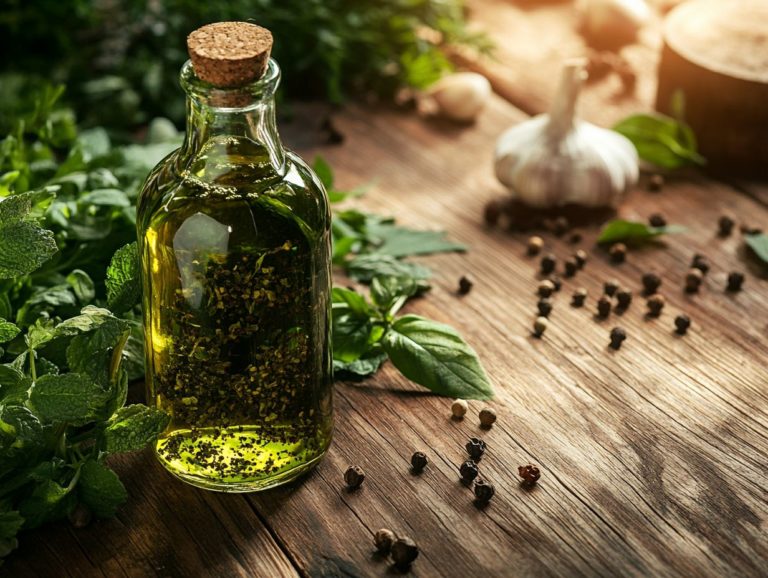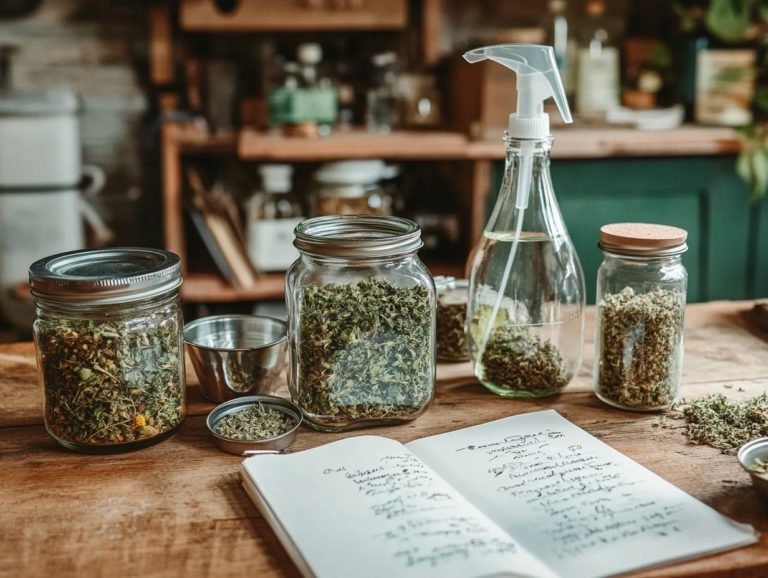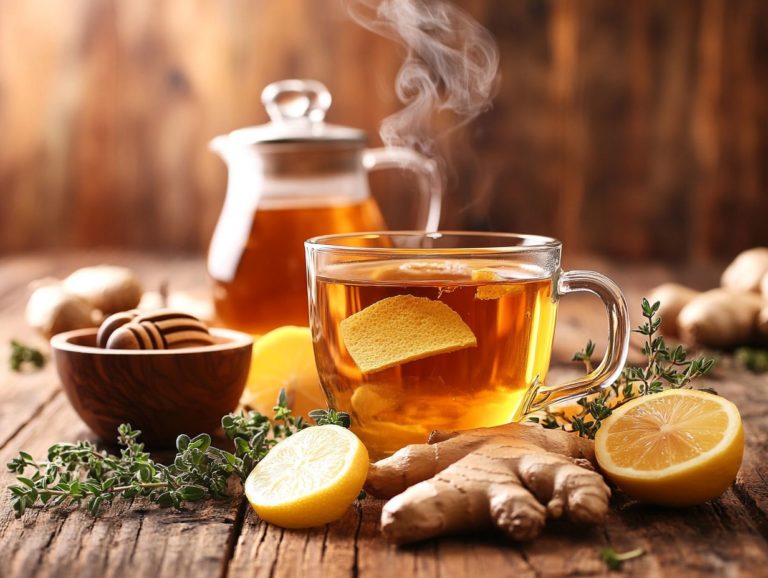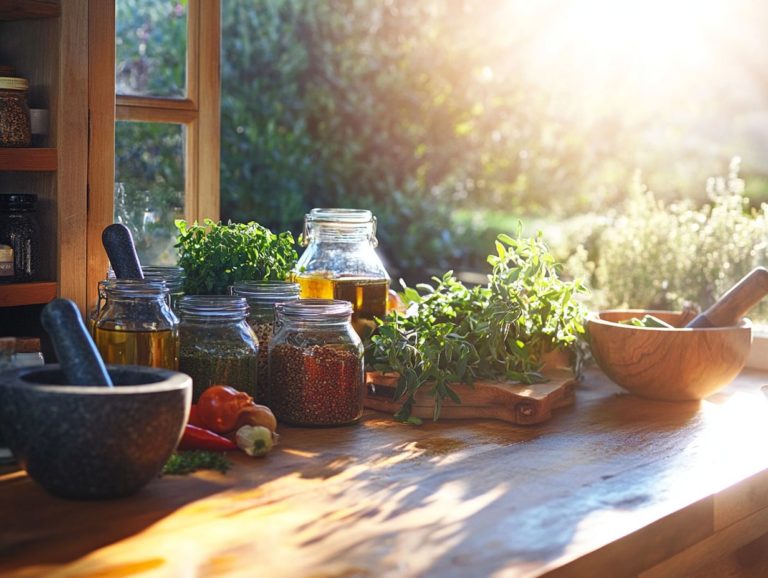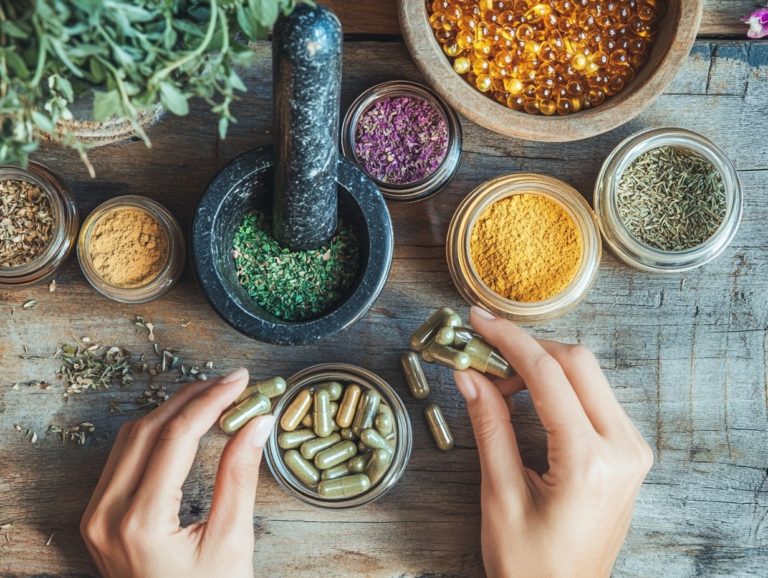Creating Herbal Remedies: Safety Tips
Herbal remedies have become increasingly popular as a natural approach to health and wellness, presenting a myriad of benefits that many find enticing.
This article delves into the essence of herbal remedies, emphasizing their potential health improvements, safety tips for creating your own, and understanding the potential side effects associated with their use. It guides you in selecting the right herbs, ensuring proper preparation, and steering clear of common pitfalls.
You ll uncover how to responsibly weave these natural solutions into your health routine, fostering a balanced approach to your overall well-being.
Contents
- Key Takeaways:
- Benefits of Using Herbal Remedies
- Safety Tips for Creating Herbal Remedies
- Common Mistakes to Avoid
- Avoiding Contamination and Misidentification
- Using Herbs Responsibly
- Benefits of Incorporating Herbal Remedies into Your Health Routine
- Frequently Asked Questions
- What are some general safety tips for creating herbal remedies?
- Are there any herbs that should be avoided when creating herbal remedies?
- Can herbal remedies interact with medications?
- Is it safe to use essential oils in herbal remedies?
- What are some guidelines for storing herbal remedies safely?
- Are there any safety concerns when consuming herbal remedies during pregnancy?
Key Takeaways:
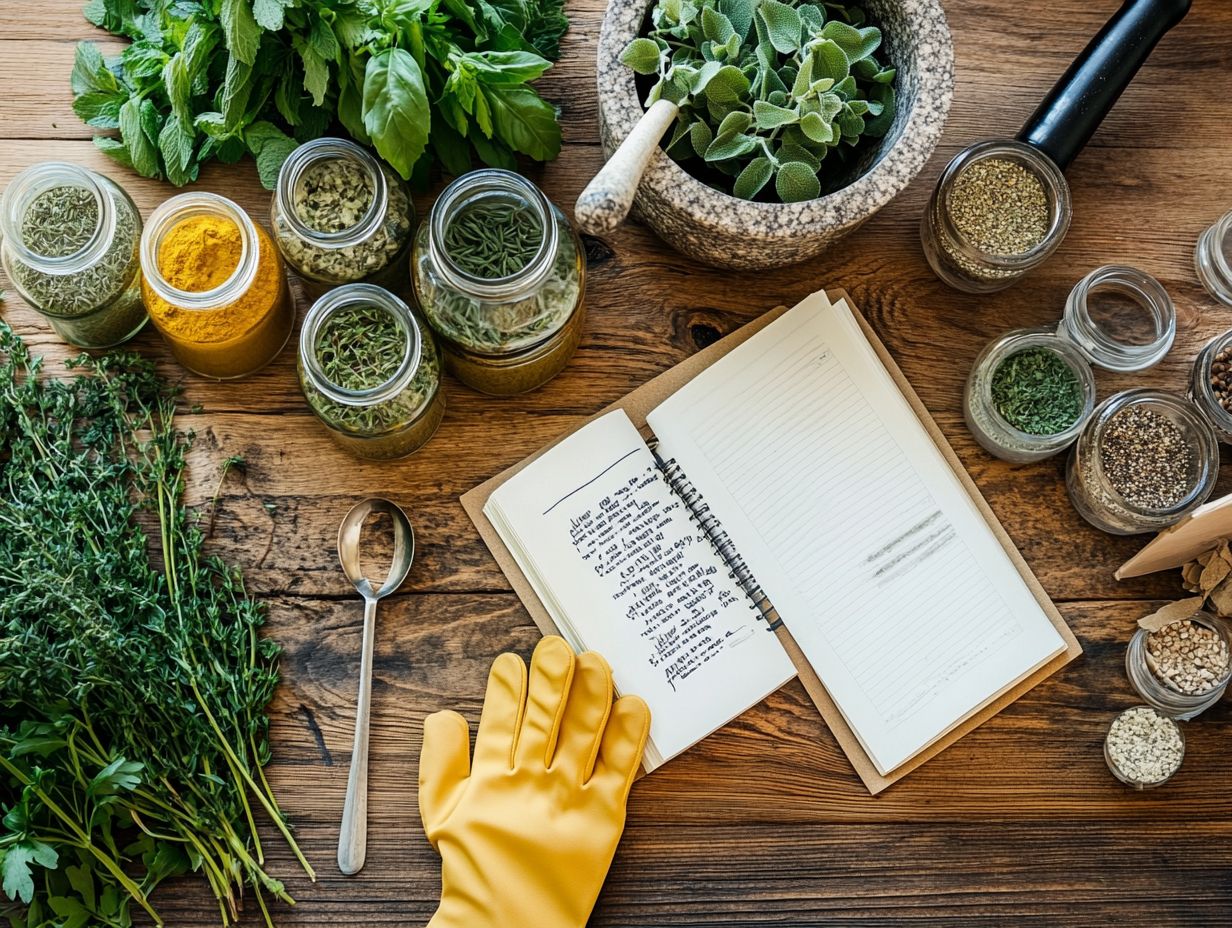
- Research and choose the right herbs for your specific health needs. Be aware of potential interactions and side effects, especially when using herbal supplements alongside prescription medications.
- Properly prepare and dose herbal remedies to ensure safety and effectiveness.
- Avoid common mistakes such as contamination, misidentification, and irresponsible use. Consider incorporating herbal remedies into your overall health routine for natural healing while being mindful of precautions.
What are Herbal Remedies?
Herbal remedies encompass the use of plant medicine as a natural strategy for health and wellness. They are available in various forms like teas, extracts, and capsules and are often referred to as products made from herbs. These time-honored practices harness the essential parts of herbs such as Echinacea, Ginseng, and St. John’s Wort to address a range of health concerns and elevate overall well-being, making them popular choices among herbalists.
While the effectiveness of herbal remedies is well-documented in folk medicine, you should consider consumer safety, potential side effects, and possible interactions with prescription medications to mitigate risks.
Historically, herbal remedies have played an important role in the healing traditions of cultures worldwide, often passed down through generations. Acknowledged as dietary supplements, these natural solutions have gained traction in the realm of non-traditional medicine, with many individuals choosing to consult trained herbalists for expert guidance on herbal medicine interactions.
Noteworthy herbs like Chamomile, known for its relaxing properties, and Turmeric, celebrated for its anti-inflammatory effects, exemplify the diverse applications of herbal remedies. Despite their accessibility, it remains crucial to consult healthcare providers to ensure safety and effectiveness, particularly if you have underlying health conditions or are taking other medications, including prescription medications.
Benefits of Using Herbal Remedies
Embracing herbal remedies can offer a wealth of benefits for those like you who are exploring alternative methods to enhance health and well-being. These incredible options can be your best friends in managing various health conditions.
Many individuals have reported remarkable improvements, including heightened energy levels, strengthened immunity, and more effective management of chronic illnesses all thanks to the medicinal properties of herbs like Kava, Ginger, and Ginkgo biloba, which emphasize the effectiveness of herbal remedies.
As you explore the world of herbal remedies, remember to approach them responsibly and consult with healthcare professionals to maximize their benefits while minimizing risks.
Natural Healing and Potential Health Improvements
Natural healing through herbal remedies gives you the power to draw upon the time-honored wisdom of alternative medicine. It helps improve health through the use of medicinal plants and herbs, enhanced by scientific research.
Many traditional practices highlight the significance of holistic approaches that not only ease symptoms but also enhance your overall health and vitality. This aligns with the ethos of herbal therapy.
Take turmeric, for example. Its remarkable anti-inflammatory properties are widely acknowledged for supporting joint health and managing chronic pain, a claim backed by various clinical studies.
Similarly, ginger has proven effective in reducing nausea and aiding digestion, offering a natural alternative to over-the-counter medications that often come with side effects.
User testimonials often praise the benefits of echinacea in boosting immune function during cold seasons. Meanwhile, peppermint is cherished not just for its delightful flavor but also for its ability to soothe digestive issues. This reinforces the popularity of herbal preparations.
By incorporating these herbs into your modern health practices, you can seamlessly blend traditional wisdom with contemporary medicine. This leads to a more holistic approach to wellness, supported by the principles of herbal medicine safety.
Safety Tips for Creating Herbal Remedies
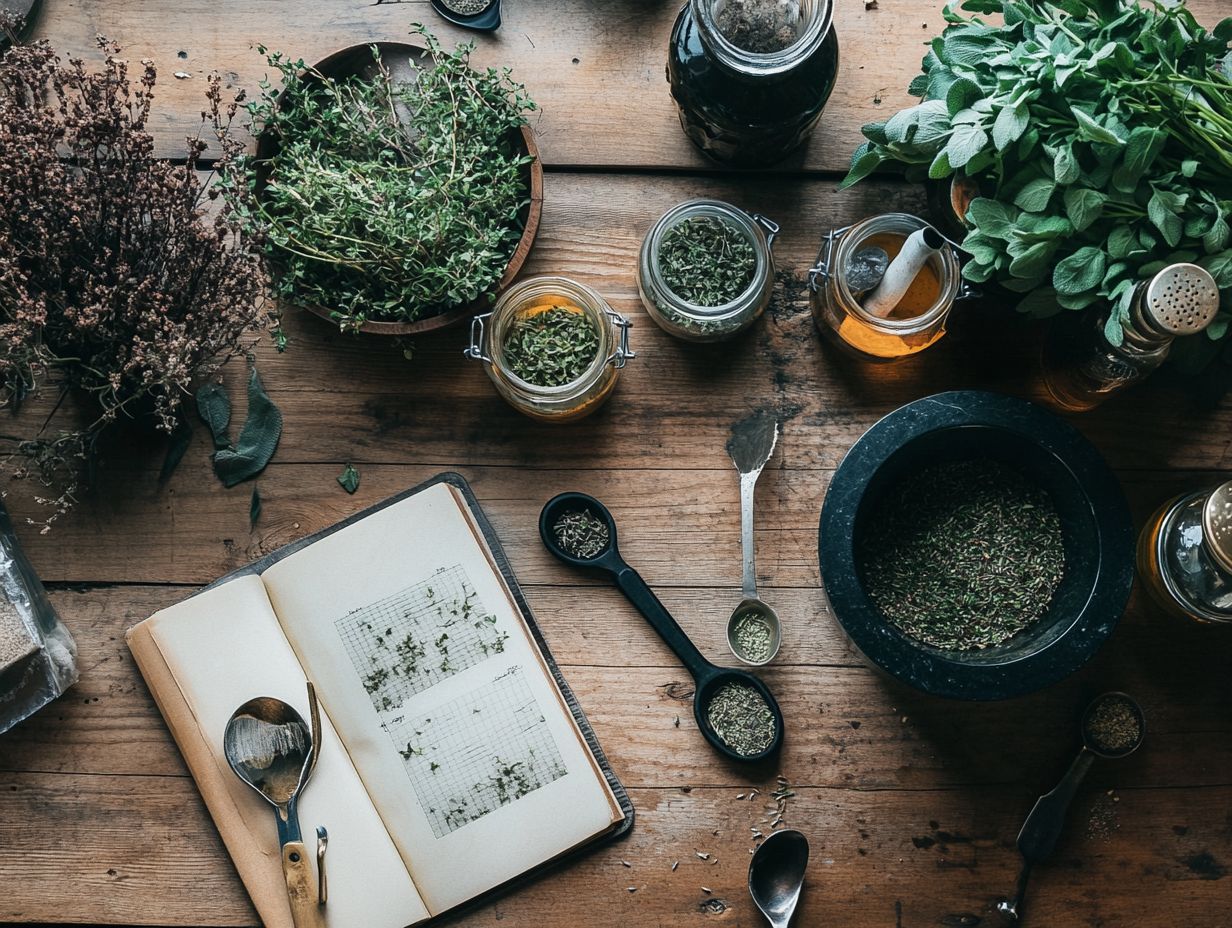
Ensuring safety when creating herbal remedies is essential for achieving the desired benefits while minimizing potential risks. You must understand the intricacies of herbal medicine safety, which includes sourcing high-quality herbs, using proper preparation methods, and following dosage recommendations.
This careful approach helps you get the most benefits and keeps you safe as a consumer, ensuring you are informed about herbal medicine quality.
Choosing the Right Herbs
Selecting the right herbs for your herbal remedies is crucial for ensuring both their effectiveness and safety, especially when considering herbal supplement safety. With many choices think Echinacea for immune support or Ginseng for an energy boost it’s a good idea to talk to someone who knows about herbs.
You should also consider your unique health conditions; some herbs may not be suitable if you have allergies, are pregnant, or have existing medical issues. This underscores the need for medical supervision.
Understanding your desired effects, whether you’re looking to alleviate stress or enhance digestion, will empower you to make informed choices, especially when considering the potential side effects of certain herbs.
Don t forget to discuss potential interactions with prescription medications, as certain herbs might influence the efficacy of conventional treatments. This highlights the importance of herbal medicine effectiveness.
When sourcing your herbs, prioritize reputable suppliers known for their high-quality products. Consider seeking guidance from experienced herbalists affiliated with the herbalists association. This approach will help you navigate the complexities of herbal medicine with confidence and safety.
Start your journey into the world of herbal remedies today your health might thank you!
Proper Preparation and Dosage
Proper preparation and dosage of herbal remedies are vital for ensuring that your body can effectively extract and utilize the active ingredients found in these herbal products.
The method of preparation affects how well herbs work. Each preparation method influences the potency and efficacy (how well something works) of the herbs. Attention to detail is essential in herbal medicine.
For example, tinctures use alcohol to extract beneficial compounds, often resulting in a more concentrated product that delivers quicker results. This showcases the medicinal use of herbs. In contrast, brewing herbal teas generally offers a milder effect, as heat and water may not extract all the active components necessary for optimal benefits.
Capsules provide convenience but may slow absorption, affecting how your body utilizes the herbs compared to other preparations.
It’s essential to assess your specific health needs and conditions when determining herbal dosages. Factors like age, weight, and overall health can vary the required levels for effectiveness. Personalizing your approach is key to achieving the best results while aligning with consumer safety principles.
Interactions and Side Effects
Understanding the interactions and potential side effects of herbal remedies is essential for your safety. These factors influence not only the effectiveness of the herbs but also your well-being, particularly regarding herbal medicine.
Some herbal products may interact with prescription medications, either enhancing or diminishing their effects. It s crucial to remain informed about herbal medicine quality. Discuss any concerns with your healthcare provider about herbal therapy safety and interactions.
Be aware! Understanding these risks will empower you. For instance, herbs like St. John’s Wort can significantly reduce the effectiveness of certain antidepressants. Additionally, ginkgo biloba could elevate the risk of bleeding when taken with anticoagulants. This highlights the need for careful evaluation of herbal remedy claims.
Given the complexities of both herbal supplements and conventional medications, it s vital to monitor for any potential adverse effects that may arise from herbal medicine.
Adopting strategies such as maintaining an open dialogue with your healthcare professionals, reviewing all medications and supplements you take, and being vigilant about any changes in your health will serve you well.
By prioritizing safety through informed choices, you can help mitigate the risks associated with using herbal treatments alongside prescribed therapies. Additionally, crafting your own herbal remedies at home ensures adherence to herbal medicine effectiveness.
Common Mistakes to Avoid
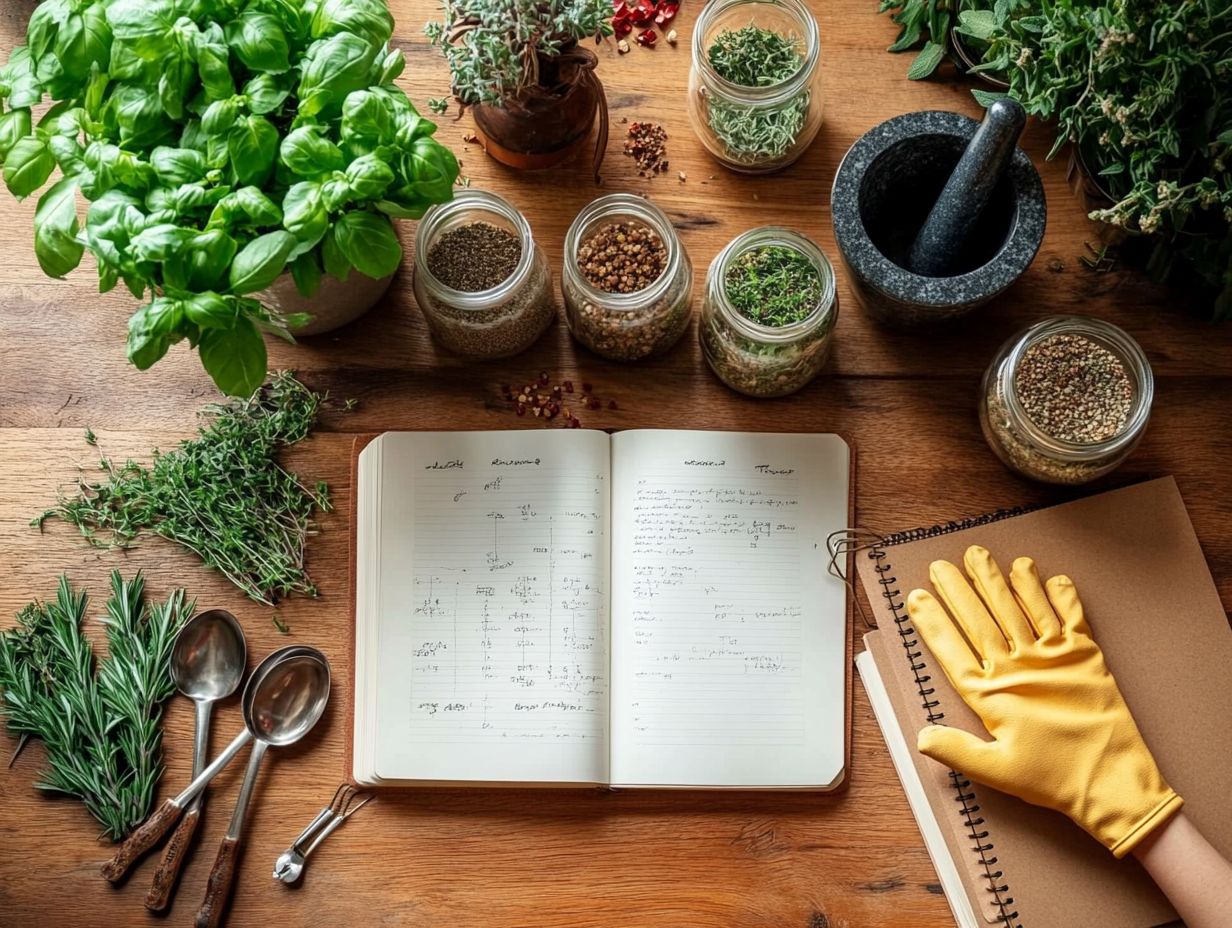
Avoiding common mistakes when using herbal remedies is crucial for enhancing their effectiveness and ensuring your safety. Many individuals unknowingly undermine their efforts. This can be avoided through proper education and awareness about herbal remedy precautions.
As interest in herbal treatments continues to grow, be aware of potential risks associated with herbal medicine. This includes improper usage, insufficient research, and sourcing low-quality herbs, which can compromise the efficacy and safety of herbal remedies.
By remaining informed and cautious, you can fully harness the benefits that herbal remedies have to offer.
Avoiding Contamination and Misidentification
Avoiding contamination and misidentification of herbs is essential for ensuring the safety and effectiveness of your herbal remedies. This aligns with best practices in herbal therapy.
Many individuals may unknowingly use contaminated or incorrectly identified plants. This can result in adverse effects and diminish the intended benefits of herbal preparations. For safe and effective use, consider following a quick guide to homemade herbal salves. Therefore, implementing precautions for using herbal remedies is crucial.
To mitigate these risks, adopt effective strategies for properly identifying herbs and ensuring their quality before use. If you’re looking to harness the benefits of herbal remedies, consider creating your own capsules and prioritize sourcing from reputable suppliers. They should provide clear and transparent information about the origin and processing of their products, ensuring adherence to consumer safety standards.
Be aware of common herbs that are often misidentified, like foxglove and belladonna. These plants have toxic properties that can harm rather than heal. Ensuring the purity of herbs protects your health and enhances the potency and reliability of your herbal healing practices.
Using Herbs Responsibly
Using herbs responsibly means understanding their benefits and potential risks. Adhering to safety guidelines is essential for protecting your health.
Consult with herbal medicine practitioners for valuable insights into responsible practices. This allows you to manage health conditions effectively while minimizing associated risks.
Prioritize thorough research and education on the traditional use of herbal remedies alongside their scientific backing. This dual approach enhances their effectiveness and helps you recognize any situations where herbs might not be safe to use with other medications, especially prescription medications. For beginners, exploring 5 essential herbal preparations can be a great starting point.
Engaging with health care providers for personalized advice is essential. They can offer tailored recommendations based on your unique health profile and monitor herbal remedies safety considerations.
By combining traditional wisdom with modern science, you can make informed decisions that align with your wellness goals. This is especially important when considering various herbal treatment options available.
Benefits of Incorporating Herbal Remedies into Your Health Routine
Embrace herbal remedies to supercharge your well-being! Incorporating these remedies into your health routine can significantly enhance your overall well-being. They provide natural health benefits that support various bodily functions and conditions.
Integrating herbs like Garlic, Ginger, and St. John’s Wort into your daily life can lead to increased energy levels, reduced stress, and bolstered immune function.
Studies reveal that regular use of these herbs can improve digestion by alleviating discomfort and bloating. They also serve as natural mood stabilizers. For instance, a community health initiative showcased the successful integration of these remedies, with participants reporting remarkable improvements in mental clarity and decreased anxiety.
Testimonials from users highlight their experiences of feeling rejuvenated and more focused, thanks to this holistic approach of embracing herbal solutions and understanding the importance of herbal medicine effectiveness.
Ultimately, this natural path not only uplifts your body but also nurtures your mind. It creates a harmonious balance in your everyday life, particularly when adhering to herbal medicine safety guidelines.
Frequently Asked Questions
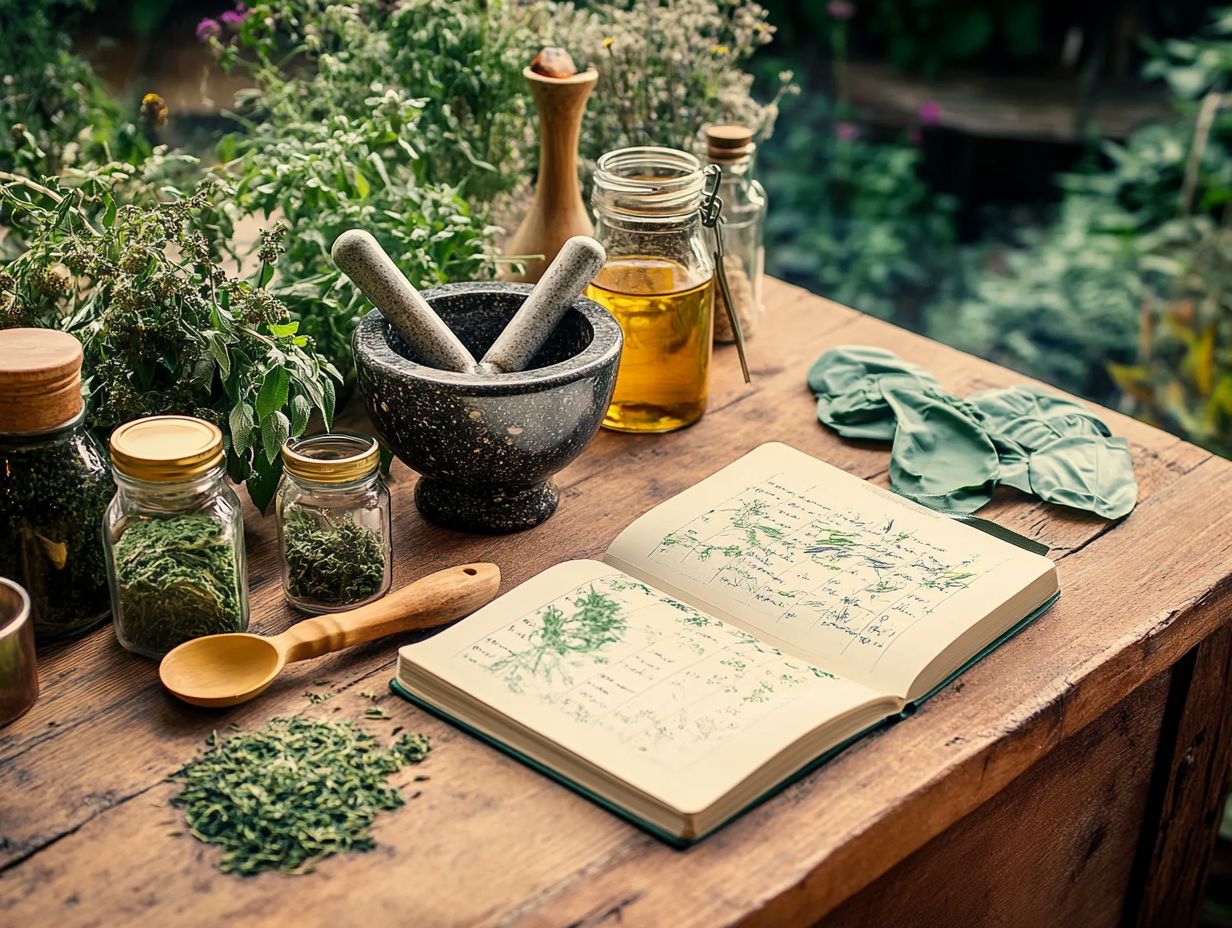
What are some general safety tips for creating herbal remedies?
Some general safety tips include researching the herbs you will be using, starting with small doses, and gradually increasing them. Always consult with a health care provider before use to ensure precautions for using herbal remedies are in place.
Are there any herbs that should be avoided when creating herbal remedies?
Yes, some herbs should be avoided when creating herbal remedies. These include comfrey, ephedra, and kava. It is important to research the safety and potential side effects of any herb before using it.
If you have more questions or want to share your experiences with herbal remedies, feel free to reach out!
Can herbal remedies interact with medications?
Yes, herbal remedies can interact with medications. Always consult a healthcare professional before using them, especially if you’re on medication or have existing health issues.
Is it safe to use essential oils in herbal remedies?
Essential oils can offer benefits, but they are very strong. Always dilute them properly before using them in herbal remedies.
What are some guidelines for storing herbal remedies safely?
Store herbal remedies in a cool, dry place away from sunlight. Always label them clearly and keep them out of reach of children and pets.
Are there any safety concerns when consuming herbal remedies during pregnancy?
Some herbs should be avoided during pregnancy due to potential harm to the baby. Always consult a healthcare professional before using any herbal remedies during this time.

